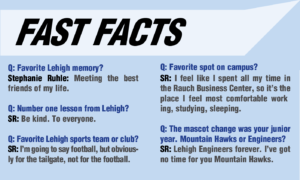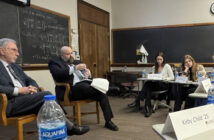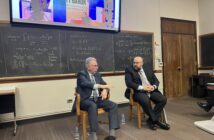
Stephanie Ruhle (Courtesy of NBC Universal)
MSNBC Live anchor and NBC News correspondent Stephanie Ruhle, ’97, will serve as the class of 2017’s commencement speaker. Ruhle spoke with The Brown and White about her career, leaving Lehigh and entering the real world and what she’s most looking forward to about returning to her alma mater 20 years later.
Q: Despite being a reporter now, you weren’t a journalism major at Lehigh, you studied international business. Do you have any advice for people who aren’t exactly sure what career path to take or what they want to do with their major?
Stephanie Ruhle: It doesn’t matter what it is that you’re doing. It matters that you’re doing your absolute best at it.
My advice is focus less on this long-term goal and what you want your title to be and what company you want to work at. If you do this junky thing today, you’ll get to do this incredible thing in six months. Stop focusing on the climb and networking and who you’re meeting and be really good at what you do.
We give young people really bad advice these days, pressing them on the importance of getting yourself out there and meeting people and going to networking events. Do not rush out of work at 5 p.m. to go to a Lehigh alumni cocktail mixer where you might meet somebody who works at a company that you want to work at.
What you need to be first is excellent at the job at hand. So the job that you are being assigned today — whether it’s getting coffee, whether it’s writing an advertising pitch, whether it’s working on an electric car — if you are not excellent at the task at hand you will have no opportunity to do the next thing. Everything is about basic fundamentals and building blocks. If you rush through the building blocks now, you’ll be cheating yourself for the rest of your life.

Designed by Kelly McCoy
Q: You’ve worked for some of the best in the business and are at the top now, but it wasn’t always that way. What were struggles or obstacles you faced after graduation, and how did you overcome them?
SR: My natural resting place is the convergence of absolute insecurity and an insatiable will and drive. The combination of the two has propelled me forward, but I’ve got a lot of insecurity, and one of the things that’s special about Lehigh — but that’s scary about it — is that you’re very protected there on that hill. You are among many students who are from the same part of the country that you are. You are nestled away in the Lehigh Valley snuggled into this hill among members of your tribe, people you’ve gone to school with for four years and, in many cases, they sound like you, and they look like you, and after living with them for four years, you finish each other’s sentences like a family.
The funny thing about Lehigh being on a hill is that for many students when you leave, in a figurative sense, you feel like you are king of the hill, and that really can give you a false sense of security. On one hand, it can give you this confidence saying, ‘I know I’ve got this great support network,’ but what you learn in the real world is the person you need to bet on, the person you need support from and the person you need to believe in is yourself.
So when I’ve struggled the most and when I’ve had the most disappointment and mistakes was when I bet on anyone else. When I bet that a boss would promote me, or someone would give me that next big interview or that I’d win a deal I didn’t win. When I put my fate in anyone else’s hands but my own, I was always setting myself up to fail. You’re always going to have some leap of faith. You’re going to have to trust other people and build a team, but for me, hoping and wishing that someone was going to solve my next problem was always a roadblock and it was hard.
So for people graduating school, when you go off to work, your skills aren’t that you know the most or you have the most experience. Because you’re a zero at both of those. But you can try the hardest and be the most tenacious, and I know I’ve always been both of those. In everything I do, there are always going to be people — and there have been — who are smarter and more talented. But I’ve always been able to outwork everyone around me.
Q: Is there anything Lehigh didn’t prepare you for? What should graduates expect to change in the real world after coming from Lehigh?
SR: Life’s not fair. That’s just a reality. It’s not something to be upset over, but when you’re at school, everybody shows up and takes the same exam, and the teacher grades them all the same way, and if things aren’t fair, you go see that teacher. There’s no justification for how life works, and you simply have to accept it. And it doesn’t mean that you’re going to accept failure, you just have to accept that life is the way it is, and counting anyone else’s money or dwelling on other people’s success is a sure recipe for failure.
Q: Is there any time in those big moments of your career that you’ve looked back and thanked Lehigh for something you learned that helped you in those experiences?
SR: I had a hard time at Lehigh. I had a hard time finding my place. There’s a lot of conforming that happens there, or at least that’s what I found when I was a student. People fit into a mold or a vertical — what their major is, who they live with, who their friends are get very segregated at Lehigh. The people that I’ve interfaced with, whether I was sitting down with Kanye West or President (Donald) Trump or Lloyd Blankfein or Bill and Melinda Gates, it would’ve been a disastrous mistake, if when I sat down with all those different people, I took on a different persona and tried to be like them. I’m not the president. I’m not a hip-hop star. I’m certainly not the richest man in the world. All I can be is myself.
So something I learned the hard way at Lehigh is the best shot you have at happiness is to be just that. Who you are. I think that when you go off to college, you’re excited. You’re inspired. It’s your first time away from home, and you think in order to fit in or succeed, you have to become something you’re not. You have to emulate others. That’s the wrong thing to be.
In my adult life, I’m inspired by others. I’m inspired by the amazing people who I get to interview. What I don’t do is emulate them. I get to interview people who live the best possible examples of the American dream, and I can learn from them and build relationships with them, but truly come at it as myself. I honor and appreciate the time I have to meet with world leaders, but what I don’t do is suddenly try to be anything but me. I try to be the best me, and I think those are hard lessons that you learn in college.
Q: The Brown and White‘s incoming editor in chief, Emily, recently published an opinion piece about some of the opposition and belittlement she’s been met with in interviews as a female journalist. Lehigh is well-known for its business and engineering schools, and you’ve done a lot of work to promote being a strong woman in these male-dominated industries, so what’s your advice for women heading into them?
SR: Forge ahead. The beautiful thing about the generation you’re living in now is it’s not acceptable. I’m not saying that sexism doesn’t exist. It does. But it’s no longer the accepted norm. It’s no longer ‘just the way it is.’
Diversity of thought and cultural diversity are so important in business. Again it’s imperfect. There are always going to be people who are going to push against you, but the good thing is, where we are in society, those who don’t accept this are the outliers. Not us.
The one thing you can do when you face this is, I’m not saying don’t fight it, but approach it with grace and positivity. Be excellent and forge ahead, and through envy or admiration, others will jump on board. And for those who don’t, they will be the outliers, and they will be the ones left out in the cold.
I spent too much of my life trying to fight a glass ceiling. But when you fight a glass ceiling, breaking glass hurts, and people get cut. I don’t want to get cut. I want to be in a positive environment, and if I can be as positive as possible, people are going to want to be in my orbit, and they will want to rise with me. I don’t want to fight the system anymore, and luckily the system is shifting with us, but it’s not perfect.
Q: So you’re 20 years out of Lehigh, what are you most looking forward to about being back on campus?
SR: I’d love to see if 20 years later I can handle the Hill without huffing and puffing. I could run that campus pretty well when I was a student. I’ll be pretty pumped with myself if 20 years and three kids later, I can still handle the Hill.
This article has been edited for length and clarity.





Comment policy
Comments posted to The Brown and White website are reviewed by a moderator before being approved. Incendiary speech or harassing language, including comments targeted at individuals, may be deemed unacceptable and not published. Spam and other soliciting will also be declined.
The Brown and White also reserves the right to not publish entirely anonymous comments.
1 Comment
Yes, life is not fair. Go Engineers.